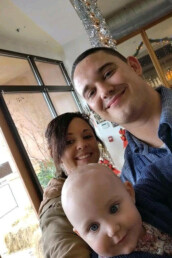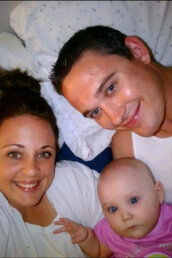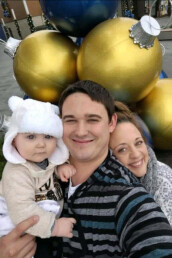
Stacie was nine months pregnant when she and David arrived at COTS’ Mary Isaak Center, looking for help. “I was actually pacing in the lobby with false labor pains,” Stacie says. “I was desperate. I didn’t want to bring our baby home to live in a car.”
Both of them knew they wanted something different for their child.
“Neither of us was raised right,” David says. “We were pretty much on our own growing up, pretty much surrounded by people who weren’t good influences. When we got together, we decided to change things for ourselves.”
Together, and while still homeless, the couple stopped using drugs and alcohol. And they put distance between themselves and the friends and family who encouraged their drug use.
For David, who grew up in Geyserville, that meant leaving behind almost everyone he knew, including the Dad who had introduced him to drugs while David was in middle school. Despite his drug use and despite the fact that he had to work fulltime to keep the lights on and the cupboards full for himself and his little brother, David graduated from high school. He knew he liked learning.
“But the whole time, I was hanging out with my Dad and his friends, not kids my own age. And I realized one day that every single one of them had been to prison. Everyone I knew had killed someone or robbed a bank or was some kind of career criminal.”
At 27, David had a brush with the law that could have turned into a disaster. Thankfully, it didn’t.
He took it as a sign to change. “My friends would say that it proved I was lucky, and I should keep going. For me, I knew this was my chance. I felt it.”
Stacie left home the day she turned 18 to escape a stepfather who was unpredictable in everything expect his vindictiveness. “I never knew if I’d be locked in the house or locked out,” Stacie says. “I never knew if he was going to lock the food up.” Her mom told her she couldn’t help.
After leaving home, Stacie married and had children. But the marriage ended in divorce and a custody battle. She ended up homeless.
For her, starting to use drugs and quitting drugs were both about survival. “When you’re out there, you use because you’re cold,” she says. “You use because you’re hungry and it takes away your appetite. You use because you feel so bad. People just walk past, and you take that in and you feel invisible. You feel worse. So you use and you feel better.”
Until one day after about six months of using, “I was almost dead. And I thought, ‘My kids deserve better than this. If I was a kid I would want my mom to fight.’ And I did. And I am.”
Together, David and Stacie began to fight their way back. They lived first in a van and then in a car. And they stayed sober together. Stacie won back visitations with her children. As he always has, David worked. He worked a string of low-paying jobs until he found one in construction that paid well.
They spent over a year homeless.
Then, one day at the end of a workday, they came to the Mary Isaak Center. David talked to the site coordinator at our front desk while Stacey paced the lobby.
“Silvia, who worked there, took one look at me and said, ‘What is going on?’” says Stacie. “She said, ‘Come in here and talk to me.’”
That conversation set things in motion, and, with help from COTS’ Rapid Re-Housing program, the couple moved into their own rental apartment three days before baby Hannah was born. “We took her home to a home,” says David.
“COTS helped make it happen,” says Case Manager Carmen Razo-Clark. “But they were persistent. They showed the landlord they were serious. It’s what we wish every client could do.” Thanks to David’s construction job, they had the income to get back on their feet. And thanks to Stacie’s organizational skills, they were able to wade through all the landlord’s paperwork and all our paperwork. Stacie even convinced the landlord to lower the rent by a few dollars to ensure that the unit would fit our program guidelines.

Their can-do spirit springs from their partnership. “They are a team,” Carmen says.
Carmen set them up with Rapid Re-Housing, a six-month program in which COTS would pay a portion of their rent while providing services and coaching. She met with Stacie and David regularly to go over their finances. “The budget, for me, is the most important thing,” Carmen says. “If it’s not balanced, that’s how I know they need more support.”

Soon after Hannah came home from the hospital, the family’s landlord decided to sell the home and gave them notice to leave.
“Panic, that’s what I felt,” says Stacie. “I had a newborn. I was freaking out. Carmen just said, ‘Let me look into it.’”
“The beauty of the program is that we are involved for many months,” Carmen says. “If things go wrong, we can help.” She made a call to a property manager who’d worked with COTS before and convinced her to meet Stacie and David.
“I let them know they would have to build a rapport and establish trust with the lady. They did the rest,” Carmen says. The couple found their second apartment and moved in.
“So much about Rapid Re-Housing has been about people giving us a chance,” says David. “Before this, I feel like we had so many doors closed on us.”
Months have passed since COTS’ financial payments ended. Now, David is working in auto sales and is studying to make a shift to the insurance industry. Stacie is staying at home with Hannah (who just turned one) and is pursuing shared custody of her other children. Her goal is to go to school in order to help other people regain their footing and find housing.